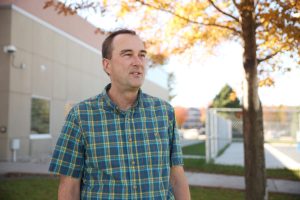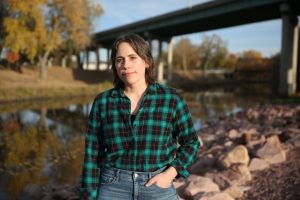
U.S. Rep. Dusty Johnson, R-South Dakota, speaks to the Greater Sioux Falls Chamber of Commerce on Aug. 22, 2025, in Sioux Falls. (Makenzie Huber/South Dakota Searchlight)
SIOUX FALLS — The United States can win the “AI race,” but not without the infrastructure and data centers necessary to develop the emerging technology, U.S. Rep. Dusty Johnson told members of the Greater Sioux Falls Chamber of Commerce on Friday.
The artificial intelligence race is a competition between the United States and other countries, including China, to dominate the technology. Johnson, a South Dakota Republican, painted a bleak future economically and democratically if the U.S. doesn’t win. President Donald Trump signed an executive order in July to facilitate construction of data centers with incentives including loans, grants and tax breaks.
Data centers are massive facilities needed to house servers and other computing infrastructure required by AI.
Data center official says other states offer better incentives than SD
Johnson said he is “befuddled” by blanket opposition to economic development, including data centers and other large projects. He said South Dakota leaders need to be “visionary” and bring new industries to the state “or we are saying that our children will have diminished opportunities.” That, Johnson said, is “absolutely unacceptable.”
“It’s un-American and it’s not at all capitalist,” he said.
While it’s important for community members to ask questions, not all projects should be rejected outright, he added.
“I think there is a great opportunity for us to do as President Trump has said and to win the battle for AI,” Johnson said. “We cannot do it if the only answer in front of us is, ‘No, always no.’”
Johnson is South Dakota’s lone U.S. representative and is running for the Republican nomination for governor in 2026. The other two declared Republican gubernatorial candidates are Aberdeen businessman Toby Doeden and South Dakota House Speaker Jon Hansen. Republican Gov. Larry Rhoden is also expected to run.
There are no massive data centers in South Dakota, but there are proposals to build them. A multi-billion-dollar data center was proposed for Deuel County earlier this year. Earlier this month, the Sioux Falls City Council took a step toward allowing construction of a new data center between Sioux Falls and Brandon. Two South Dakota electricity providers, Black Hills Corp. and NorthWestern Energy, announced a merger this week and cited future demand from data centers as a reason for the deal.
Representatives with both of the data center projects have said they might not land in South Dakota without competitive incentives from the state. The state Senate narrowly rejected legislation in February that would have provided tax refunds for data centers.
I think there is a great opportunity for us to do as President Trump has said and to win the battle for AI. We cannot do it if the only answer in front of us is, ‘No, always no.’
– U.S. Rep. Dusty Johnson, R-South Dakota
Opponents to the legislation cited concerns about tax fairness if the state offers incentives for companies to build in South Dakota, as well as concerns about water and energy demands to operate and cool data center systems.
Johnson said the projects create new jobs for South Dakotans who have the skills to run the operations and are “good customers” to utility companies, because they provide a steady demand for energy and can run on generators when there is too much demand. But he said the projects are threatened by opposition that goes beyond the philosophy of “Not In My Backyard.”
“Forget the NIMBYs, we’ve got BANANAs: ‘Build Absolutely Nothing Anywhere Near Anything,’” Johnson said. “It is a disease that’s metastasizing.”
In an interview with South Dakota Searchlight after the public discussion, Johnson said communities and states “need to step up” and present incentives that “work for the community and state.” He said building data centers could also generate new property taxes that would lessen the burden on other property taxpayers, which is a focus of the Legislature this year.
“If we want to reduce property taxes, we need to grow the property tax base,” Johnson said. “Obviously there is some role for government efficiency, but that’s not going to get us as far as we need.”
Our D.C. Bureau tracks Congress for you: Get updates in our free newsletter.





